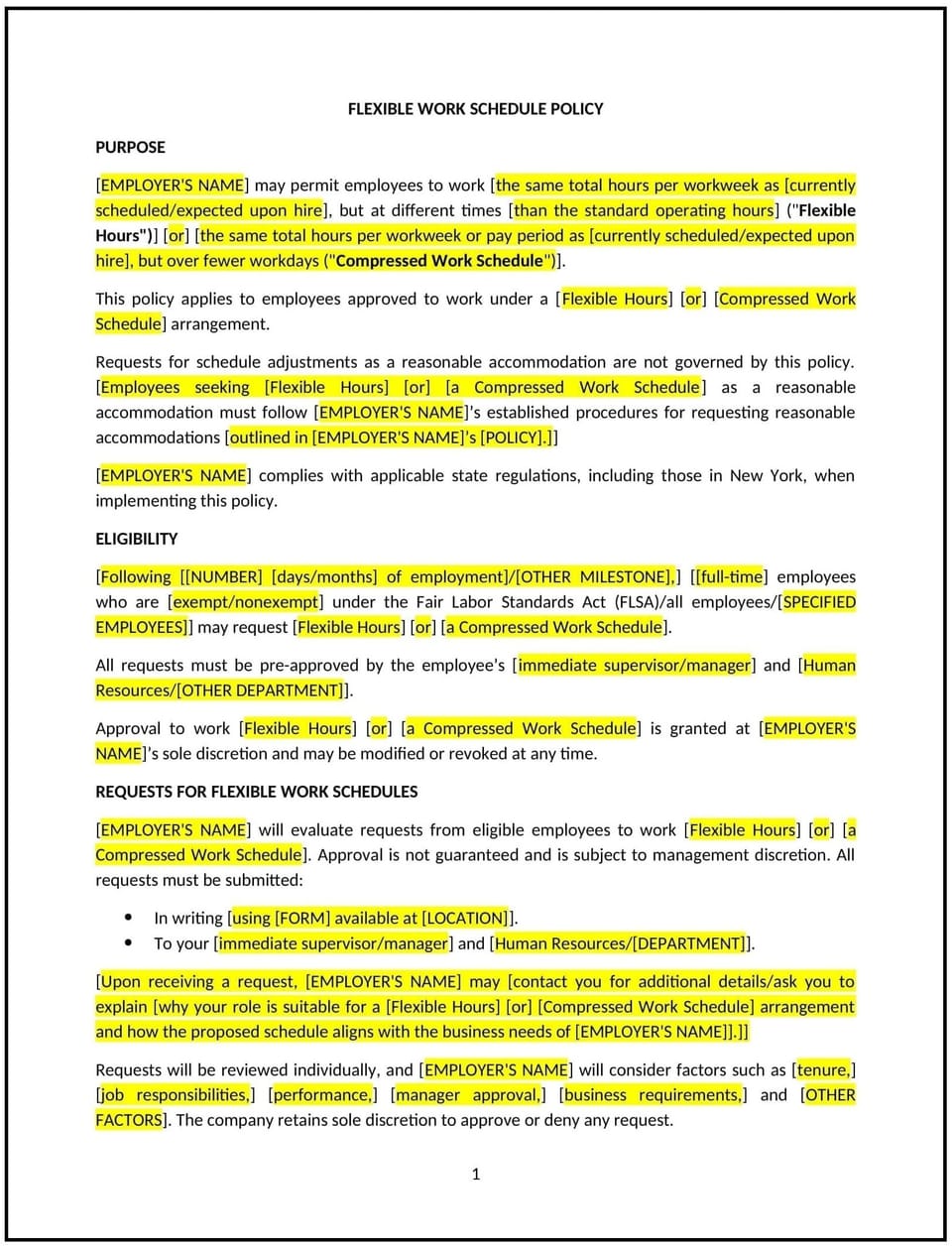Flexible work schedule policy (New York): Free template

Flexible work schedule policy (New York)
This flexible work schedule policy is designed to help New York businesses establish clear guidelines for offering alternative work arrangements, such as adjusted hours, compressed workweeks, or remote work options. Whether businesses are enhancing work-life balance, accommodating employee needs, or improving productivity, this template ensures all key considerations are addressed.
By using this template, businesses can support employee satisfaction, maintain operational efficiency, and align with relevant labor laws in New York.
How to use this flexible work schedule policy (New York)
- Define eligibility criteria: Clearly outline which roles or employees qualify for flexible work arrangements, considering job requirements and operational needs.
- Specify available options: Detail the types of flexible work schedules offered, such as remote work, flexible start and end times, or compressed workweeks.
- Establish approval procedures: Provide steps for employees to request a flexible schedule, including how requests will be reviewed and approved.
- Set expectations: Outline performance expectations, communication standards, and any reporting requirements for employees with flexible schedules.
- Address compliance: Ensure the policy complies with New York labor laws, including those related to overtime, minimum wage, and working hours.
Benefits of using a flexible work schedule policy (New York)
This policy offers several benefits for New York businesses:
- Improves employee satisfaction: Flexible schedules help employees balance personal and professional responsibilities, increasing morale and engagement.
- Enhances productivity: Allowing employees to work during their most productive hours can lead to improved performance and efficiency.
- Reduces absenteeism: Flexibility can help employees manage personal commitments without missing work, reducing unplanned absences.
- Attracts and retains talent: Offering flexible schedules makes businesses more appealing to job seekers and helps retain top-performing employees.
- Aligns with modern work trends: A flexible policy demonstrates adaptability to evolving workplace expectations, fostering a progressive company culture.
Tips for using this flexible work schedule policy (New York)
- Communicate the policy clearly: Share the policy with employees during onboarding and through regular updates to ensure understanding and accessibility.
- Use pilot programs: Test flexible work arrangements in select departments or teams before implementing them across the organization.
- Monitor performance: Regularly evaluate the impact of flexible schedules on employee productivity, team collaboration, and overall business goals.
- Address fairness: Ensure the policy is applied equitably across employees to avoid perceptions of favoritism or bias.
- Review regularly: Update the policy to reflect changes in New York labor laws, employee needs, or workplace technologies.
Q: What types of flexible schedules can businesses offer?
A: Businesses may offer options such as remote work, staggered start and end times, compressed workweeks, or job sharing, depending on their operational needs.
Q: Are all employees eligible for flexible schedules?
A: Eligibility depends on the employee’s role, job requirements, and the business’s operational needs. Some positions may require fixed schedules due to the nature of the work.
Q: How should businesses handle timekeeping for flexible schedules?
A: Businesses should use reliable time-tracking tools to ensure accurate recording of hours worked, especially for employees eligible for overtime under New York labor laws.
Q: Can flexible schedules be temporary?
A: Yes, businesses may offer temporary flexible schedules to accommodate specific employee needs or as part of a trial period for evaluating the arrangement.
Q: How often should this policy be reviewed?
A: The policy should be reviewed annually or when significant changes occur in workplace practices, labor laws, or employee needs.
This article contains general legal information and does not contain legal advice. Cobrief is not a law firm or a substitute for an attorney or law firm. The law is complex and changes often. For legal advice, please ask a lawyer.


